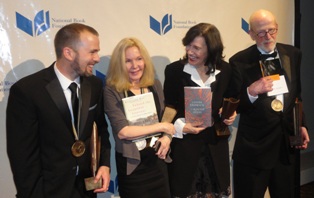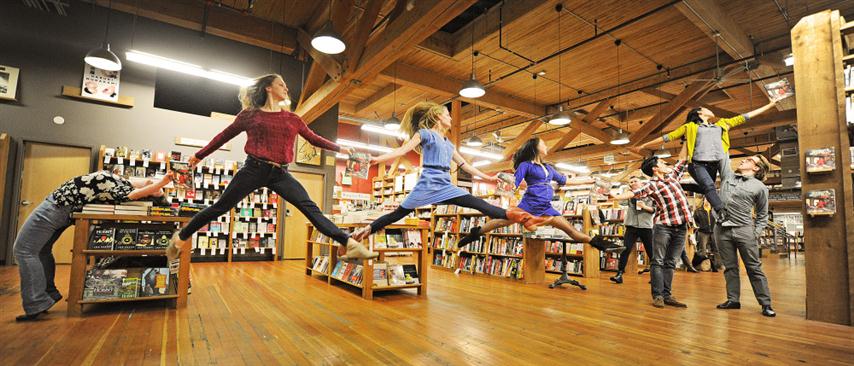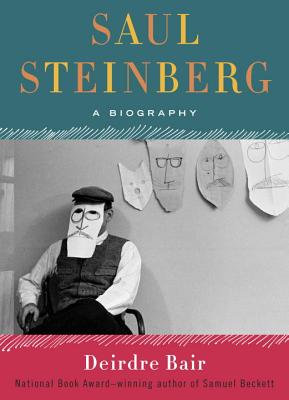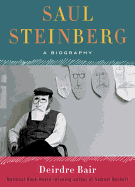National Book Awards Survive the Storm
"Do you want to see the National Book Foundation's new phone system?" executive director Harold Augenbraum said as guests began arriving at Cipriani Wall Street for last night's National Book Awards ceremony. He pulled his cell phone out of his jacket pocket: "Here it is." The Foundation's office building in lower Manhattan was hit especially hard by Hurricane Sandy, leaving the staff just two weeks to organize the annual production from desks and kitchen tables at home.
 |
|
| NBA winners Alexander, Boo, Erdrich, Ferry. | |
You wouldn't have known it from the evening's flawless execution: NPR's Faith Salie gave her all as master of ceremonies, joking about recent press reports about attempts to glam up the show. "From where I stand," she quipped, "looking out at your sexy, sexy faces, you are all post-dowdy." New York Times chairman and publisher Arthur O. Sulzberger, Jr., accepted the Literarian Award for outstanding service to the American literary community, taking the opportunity to reflect on the enduring appeal of literature. "When our laptops and iPads and e-readers ran out of life" in the chaos after the hurricane, he reflected, "we turned to books, reading them by candlelight." (He also assured the audience that "books will remain, and will always be, part of the conversation at the Times.") Martin Amis introduced Elmore Leonard, the recipient of the medal for distinguished contribution to American letters, calling his writing "as American as jazz" and observing that "the [thriller] genre cannot hold him anymore than science fiction could hold Kurt Vonnegut or J.G. Ballard." Leonard himself cheerfully noted that "my books aren't exactly plot-driven. They're about people, with guns, in dire situations." He also tipped his hat to George V. Higgins as an author who pointed him in the direction of his distinctive voice; after reading The Friends of Eddie Coyle, Leonard said, "I stopped trying to tell what was going on in my books and began to show it."
After an intermission for dinner, the main awards were presented. William Alexander won the young people's literature award for Goblin Secrets (Margaret K. McElderry/S&S), while David Ferry took the poetry prize for Bewilderment (University of Chicago Press). As he presented the nonfiction award to Katherine Boo, judge Woody Holton praised Behind the Beautiful Forevers (Random House) as the debut of "a new genre of nonfiction," rooted in immersive observation and interviewing in a slum community in India over an extended period of time that reminds readers that "good listening is an ethical act." Finally, Louise Erdrich won the fiction prize for The Round House (Harper), literally speechless as she came to the podium. Finally, tears in her eyes, she offered a greeting in Ojibwe "for all of the Native people watching this on livestream," and thanked her publishers and family before also expressing her gratitude to the judges for selecting her novel about an Ojibwe family's search for justice after a traumatic attack: "Thank you," she concluded, "for giving [this book] a wider audience." --Ron Hogan








 Effective December 31, Jennifer Bigelow is resigning as executive director of the Southern California Independent Booksellers Association after 13 years, saying that her focus needs to be on her family.
Effective December 31, Jennifer Bigelow is resigning as executive director of the Southern California Independent Booksellers Association after 13 years, saying that her focus needs to be on her family.
 R.J. Julia Booksellers, Madison, Conn., wound up with so many items for its Fill-A-Truck donation drive to benefit victims of Hurricane Sandy in Staten Island, N.Y., that it had to shift from a 15-ft. truck to a 24-ft. truck, lent by O'Neill & Sons moving company. (Another co-sponsor for the relief effort was First Niagara Bank.) Contributions, from a list requested by the Unitarian Church of Staten Island, included brooms, crowbars, contractor bags, personal toiletries and more. The full truck was driven to Staten Island by a volunteer and Kevin Coady, husband of R.J. Julia owner Roxanne Coady. Here the truck is unloaded in Staten Island.
R.J. Julia Booksellers, Madison, Conn., wound up with so many items for its Fill-A-Truck donation drive to benefit victims of Hurricane Sandy in Staten Island, N.Y., that it had to shift from a 15-ft. truck to a 24-ft. truck, lent by O'Neill & Sons moving company. (Another co-sponsor for the relief effort was First Niagara Bank.) Contributions, from a list requested by the Unitarian Church of Staten Island, included brooms, crowbars, contractor bags, personal toiletries and more. The full truck was driven to Staten Island by a volunteer and Kevin Coady, husband of R.J. Julia owner Roxanne Coady. Here the truck is unloaded in Staten Island.
 Founded in 1984, Quail Ridge had sales of $3 million last year. The 9,400-sq.-ft. store sells books, CDs, stationery, calendars and gift items. It stocks about 70,000 titles.
Founded in 1984, Quail Ridge had sales of $3 million last year. The 9,400-sq.-ft. store sells books, CDs, stationery, calendars and gift items. It stocks about 70,000 titles.
 The Night Santa Got Lost: How NORAD Saved Christmas
The Night Santa Got Lost: How NORAD Saved Christmas Many people may not know who Saul Steinberg is--at least not by name. Show them a few of his thousands of New Yorker illustrations, though, and they might know who you're talking about. And none of his works embodied his irony and sketchbook way of storytelling more than his endlessly reproduced and adapted New Yorker cover from 1976 "View of the World from 9th Avenue." Mention that, and everyone nods and says "Oh, that guy."
Many people may not know who Saul Steinberg is--at least not by name. Show them a few of his thousands of New Yorker illustrations, though, and they might know who you're talking about. And none of his works embodied his irony and sketchbook way of storytelling more than his endlessly reproduced and adapted New Yorker cover from 1976 "View of the World from 9th Avenue." Mention that, and everyone nods and says "Oh, that guy."